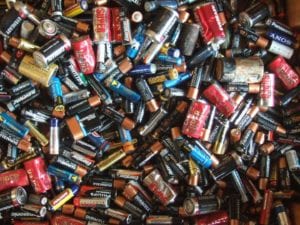E-waste is anything that operates from a power source (electricity or batteries) and includes computers, phones, household appliances and light bulbs, to name a few. “E-waste contains hazardous materials such as mercury and should not be disposed of at landfill. A lot of supermarkets collect e-waste for recycling, such as old bulbs and batteries,” mentions Gibson.
Food waste Another common waste stream in the dustbin – food waste. Old scraps of food and even garden waste can easily be composted at home. Glass “Most glass containers can be recycled, no matter the colour. Glass bottles do not need to be separated by colour, however it is advisable that the lids are removed,” advises Oelofse. Glass and break-ware items that can’t be recycled include: computer and television screens, light bulbs, car headlights, laboratory glass, windscreens, window glass, crystal and opaque drinking glass, mirrors, heat-resistant ovenware, ceramics and clay pots. Oil All used oil can be recycled and includes hydraulic oil, gear oil and engine oil. Paper Paper is another widely accepted waste stream for recycling and includes: newspapers, magazines, office paper, cardboard boxes and pamphlets. Plastic Many plastic materials can be recycled. Gibson advises that bottle caps and lids are removed from plastic packaging. “The recyclability of this waste stream depends on the equipment of recyclers and what the lid is made of.”
As the expression goes, ‘waste not, want not’. By using resources sparsely and knowing what can be recycled, we can all contribute to a cleaner and healthier environment.
The Institute of Waste Management of Southern Africa (IWMSA) gives helpful tips and insight on what should be left out of the dustbin.
“There are various waste streams and most of them are appropriate for recycling. By seeing waste as a resource, we can help protect virgin materials and aim to create a circular economy where very little waste is generated,” says Prof Suzan Oelofse, President of the IWMSA.
A nifty website for all those interested in being environmentally friendly is MyWaste. Founder of MyWaste, Mark Gibson elaborates, “It all comes down to knowing the different waste materials and what should be done with it.
The website enables residents to select the waste they want to recycle. We then provide them with a list of their nearest recyclers and buy-back centres in their area.”
Oelofse and Gibson explore the most common waste streams below and the best course of action to keep it out of landfill sites:
Batteries
“Car batteries are recyclable. Alkaline batteries are not often recycled and should be disposed of as a hazardous material. The best option would be to switch to rechargeable nickel-cadmium batteries, which are widely recycled after their lifespan,” guides Gibson.
Cans
Oelofse states that nearly all cans and tins can be recycled. “These include: food cans, aluminium cans, paint tins, steel beverage cans, oil cans and aerosol cans. Just make sure that it is clean!”
Electronic waste (E-waste)







